肯定句变否定句课件
肯定句变否定句+附答案
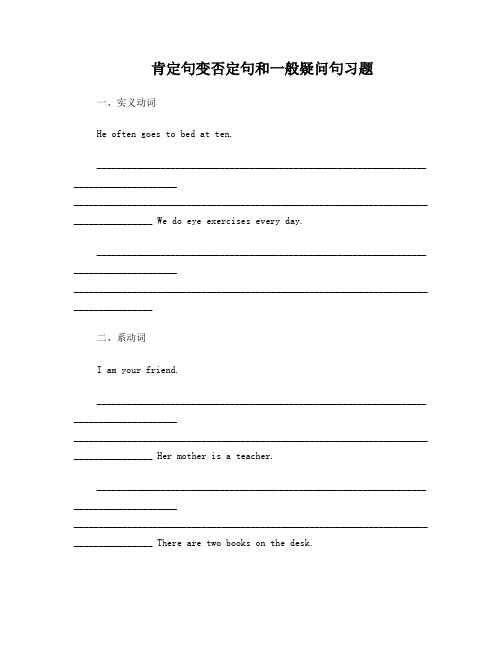
肯定句变否定句和一般疑问句习题一、实义动词He often goes to bed at ten.___________________________________________________________________ _____________________________________________________________________________________________ ________________ We do eye exercises every day.___________________________________________________________________ _____________________________________________________________________________________________ ________________二、系动词I am your friend.___________________________________________________________________ _____________________________________________________________________________________________ ________________ Her mother is a teacher.___________________________________________________________________ _____________________________________________________________________________________________ ________________ There are two books on the desk.___________________________________________________________________ _____________________________________________________________________________________________ ________________ 三、进行时The girl is standing at the station.___________________________________________________________________ _____________________________________________________________________________________________ ________________ The students are playing basketball on the playground.___________________________________________________________________ _____________________________________________________________________________________________ ________________ I am looking for a job recently.___________________________________________________________________ _____________________________________________________________________________________________ ________________ 六、情态动词You can use this dictionary.___________________________________________________________________ _____________________________________________________________________________________________ ________________ You need go tomorrow.___________________________________________________________________ _____________________________________________________________________________________________ ________________将下列陈述句变为否定句和一般疑问句。
初中英语 人教版七年级上册Unit5 肯定句改为否定句和一般疑问句课件
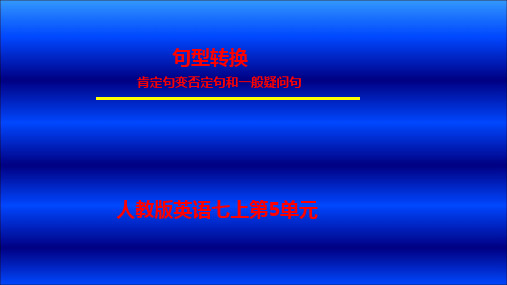
保镖法
eg: He likes bananas.(改为否定句)
He d_o_e_s_n_’__t_ __li_k_e_____ bananas?
第三人称单数胆子小, 出门需要带保镖
保镖开路,原形毕露
谓语动词是实义动词-------肯定句变一般疑问句
方法
主语第三人称单数 主语非第三人称单数
在句首加Does 在句首加Do
保镖开路,原形毕露
练一练
1 .My mother comes from Jiangsu.(改为否定句) My mother __d__o_e_s__n_’_ t co__m__e__ from Jiangsu.
2 They like swimming.(改为否定句) They ___d_o__n_’__t_ __li_k_e_____ swimming.
句型转换
肯定句变否定句和一般疑问句
人教版英语七上第5单元
目
根据谓语动词把句子分类 谓语动词是be动词怎么变否定句和一般疑问句 谓语动词是实义动词的怎么变否定句和一般疑问句的心脏
1. She is a student. 2. They are from China.
谓语动词是be动词
√ I'm not a boy. × I amn’t a boy.
e.g He is from China.(改为否定句) He is not from China.
He isn't from China.
谓语动词是be 动词-------肯定句变一般疑问句
方法
一提 二改
把be提前 第一人称改第二人称
保镖开路, 原形毕露
保镖开路,原形毕露
变否定句和一般疑问句方法
否定句及一般疑问句
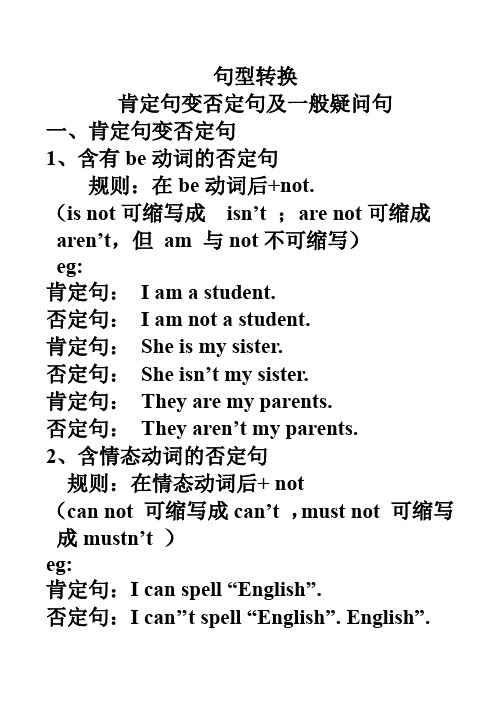
句型转换肯定句变否定句及一般疑问句一、肯定句变否定句1、含有be动词的否定句规则:在be动词后+not.(is not可缩写成isn’t ;are not可缩成aren’t,但am 与not不可缩写)eg:肯定句:I am a student.否定句:I am not a student.肯定句:She is my sister.否定句:She isn’t my sister.肯定句:They are my parents.否定句:They aren’t my parents.2、含情态动词的否定句规则:在情态动词后+ not(can not 可缩写成can’t ,must not 可缩写成mustn’t )eg:肯定句:I can spell “English”.否定句:I can’’t spell “English”.English”.肯定句:I must find it.否定句:I mustn’t find it.3、含有实义动词的句子的否定句构成(1)第三人称单数做主语。
(he、she、it或表示单个人或物的第三人称名词)规则:要在行为动词前加上助动词doesn’t,然后将动词恢复原形。
eg :肯定句:He has a soccer ball.否定句:He doesn’t have a soccer ball.(2)其它人称做主语规则:在行为动词前加don’t ,句子中的行为动词用原形。
eg:肯定句:They like bananas.否定句:They don’t like bananas.注:(1)在变否定句时,如遇some应变any Here are some books.Here aren’t any books.二、肯定句变一般疑问句1、含有be动词的句子变一般疑问句规则:把be动词提至句首,第一人称变第二人称,句末句号变问号。
(I/we变成youMy/our变成your)肯定句:I am a student.一般疑问句:Are you a student?肯定句:She is my sister.一般疑问句:Is she your sister?肯定句:They are my parents.一般疑问句:Are they your parents?2、含有情态动词的句子变一般疑问句规则:把情态动词提至句首,第一人称变第二人称,句末句号变问号。
英语四个基本时态的 肯定句变否定句

_M_r_s_.__L_i_a_n_d__K_i_t_t_y__a_r_e__n_o__t_i_n__a_b__ig__s_h_o_p__. ________ .
8. He is crying(哭) under the tree.
____H__e_i_s_n__o_t__c_r_y_i_n_g_(__哭__)___u_n_d_e_r__t_h_e__t_r_e_e__. _____ .
9. His birthday is on the twentieth of November.
The old man doesn’t do morning exercises(早操) every morning.
23. We are from China.
_________W___e__a_r__e_n__’t__f__r_o_m___C__h_i_n_a__.________ .
24. He goes to the library(图书馆) on Sundays.
_____H_e__d_o_e_s_n_’_t__g_o_t_o__th__e_l_ib_r_a_r_y__o_n_S_u_n_d_a_y_s_.____ .
25. They have a class meeting every week.
_T_h__e_y_d__o_n_’t__h_a_v_e__a__c_l_a_s_s_m__e_e_t_i_n_g__e_v_e_r_y__w__e_e_k_. .
小学英语肯定句改为否定句(知识点+练习题)
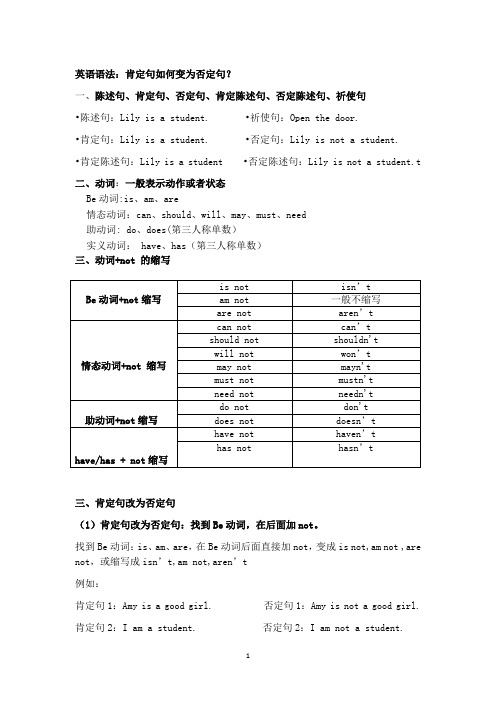
英语语法:肯定句如何变为否定句?一、陈述句、肯定句、否定句、肯定陈述句、否定陈述句、祈使句•陈述句:Lily is a student. •祈使句:Open the door.•肯定句:Lily is a student. •否定句:Lily is not a student. •肯定陈述句:Lily is a student •否定陈述句:Lily is not a student.t二、动词:一般表示动作或者状态Be动词:is、am、are情态动词:can、should、will、may、must、need助动词: do、does(第三人称单数)实义动词: have、has(第三人称单数)三、动词+not 的缩写三、肯定句改为否定句(1)肯定句改为否定句:找到Be动词,在后面加not。
找到Be动词:is、am、are,在Be动词后面直接加not,变成is not,am not ,are not,或缩写成isn’t,am not,aren’t例如:肯定句1:Amy is a good girl. 否定句1:Amy is not a good girl. 肯定句2:I am a student. 否定句2:I am not a student.肯定句3:These flowers are very beautiful.否定句3:These flowers are not very beautiful.(2)肯定句改为否定句:找到情态动词,在后面加not。
找到情态动词:can、should、will、may、must、need,在情态动词后面直接加not ,变成 can not, should not, will not,may not,must not,need not 或缩写成can’t ,shouldn't,won’t ,mayn't,mustn't,needn’t例如:肯定句1:I can speak English. 否定句1:I can not speak English.肯定句2:You should go now. 否定句2:You should not go now.肯定句3:I must do my homework. 否定句3:I must not do my homework.(3)肯定句改为否定句:在动词前面加 don't 或doesn't。
怎样把肯定句改成否定句及怎样把否定句改成肯定句

否定句:我们不要做一个懒惰的孩子。 注:要→不要 勤劳→懒惰
(二)否定句改为肯定句
例:小明不是一个调皮的孩子。(否定句改 为肯定句)
肯定句:小明是一个乖巧的孩子。
注:调皮→乖巧
练一练
1、小红是一个好孩子。 改成否定句:
2、小丁不喜欢晚睡。 改成肯定句:
肯定句和否定句怎样互改
乐安谷岗中心小学:赖祥梅
• 肯定句与否定句的互改的要点:
• 1、肯定句改否定句:加上否定词,并把关键词 改为与其意思相反的词语。(双重否定表肯定)
• 2、否定句改肯定句:去掉否定词,把关键词改 为与其意思相反的词语。
• 3、改后的句子不能改变句意,要和原句的句意 一致。
(一)肯定句改为否定句
1、小红是一个好孩子。 否定句:小红不是一个坏孩子。
2、小丁不喜欢晚睡。 肯定句:小丁喜欢早睡。
肯定句变否定句和一般疑问句类型_习题(整理了答案)备课讲稿
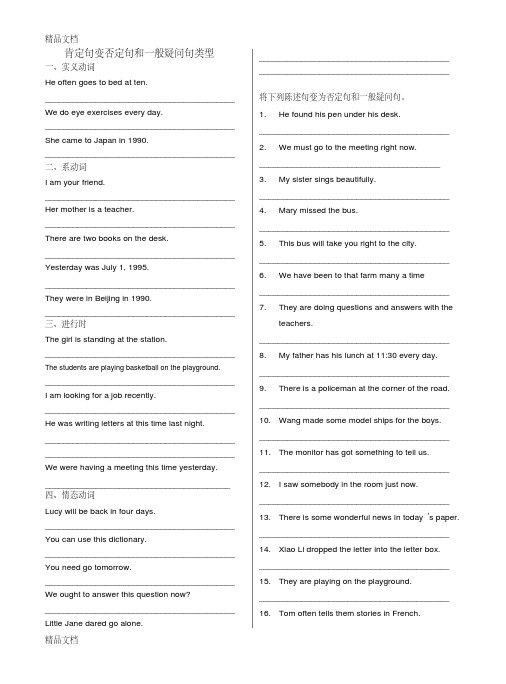
肯定句变否定句和一般疑问句类型一、实义动词He often goes to bed at ten._________________________________________ We do eye exercises every day._________________________________________ She came to Japan in 1990._________________________________________二、系动词I am your friend._________________________________________ Her mother is a teacher._________________________________________ There are two books on the desk._________________________________________ Yesterday was July 1, 1995._________________________________________ They were in Beijing in 1990._________________________________________ 三、进行时The girl is standing at the station._________________________________________ The students are playing basketball on the playground._________________________________________ I am looking for a job recently._________________________________________ He was writing letters at this time last night._________________________________________ _________________________________________ We were having a meeting this time yesterday.________________________________________ 四、情态动词Lucy will be back in four days._________________________________________ You can use this dictionary._________________________________________ You need go tomorrow._________________________________________ We ought to answer this question now?_________________________________________ Little Jane dared go alone. __________________________________________________________________________________将下列陈述句变为否定句和一般疑问句。
肯定句变否定句

肯定句变否定句一、动词后直接加not。
原句中含有be动词 (am, is, are, was, were) 。
I am a teacher. ---->I am not a teacher.我是一个老师。
---->我不是老师。
原句中含有情态动词 (can, shall, will, may, should, would, might, had better 等) 。
Li Lei can swim.---->Li Lei cannot/can't swim.李雷会游泳。
---->李雷不会游泳。
He will go to the zoo if it rains tomorrow.---->He will not/won't go to the zoo if it rains tomorrow.如果明天下雨,他将去动物园。
---->如果明天下雨,他就不去动物园了。
原句中含有助动词(have, has, had)。
We have learned 3,000 words. ---->We have not/haven't learned 3,000 words.我们已经学会了3000个单词。
---->我们还没有学会3000个单词。
We have heard from him since he left. ---->We have not heard from him since he left.他走后我们收到他的来信。
---->他走后杳无音讯。
二、原句中没有be动词,助动词或情态动词时,要在行为动词前加助动词 (do, does, did) 与否定副词 not 的缩写形式。
句中第一个动词是原形时,在其前加上don’t。
I get up at six o'clock every day.---->I don't get up at six o'clock every day.我每天六点起床。
- 1、下载文档前请自行甄别文档内容的完整性,平台不提供额外的编辑、内容补充、找答案等附加服务。
- 2、"仅部分预览"的文档,不可在线预览部分如存在完整性等问题,可反馈申请退款(可完整预览的文档不适用该条件!)。
- 3、如文档侵犯您的权益,请联系客服反馈,我们会尽快为您处理(人工客服工作时间:9:00-18:30)。
肯定祈使句变否定祈使句,也是 在动词前加直接don't. 3. Have some bread, Tom. Don't have any bread ,Tom. 4. Please open your books.
Please don't open your books.
Hale Waihona Puke ②当句中的动词是第三人称单数时, 在动词前加doesn’t ,动词还原原形。 She likes singing. → She doesn’t like singing. She does her homework. → She doesn’t do her homework.
肯定句变否定句
1.I am a student. → I am not a student. 2.You are sad. → You are not sad. 3. She is a good girl. → She is not a good girl. 4.Yesterday was Monday. → Yesterday was not Monday. 5.They were busy yesterday. → They were not busy yesterday.
1.如果句中有be动词
( is, am , are, was,
were),就在be动词后 面直接加not。
be 动词和not的缩写形式: is not = isn't are not = aren't was not = wasn't were not = weren't 注意:am not 不能缩写。
肯定句变否定句 练一练
1. I am your friend. _____________________________
2. My mother is a worker. _____________________________
3. There are some books on the bookshelf. _____________________
2. You can use the dictionary. You can't use the dictionary.
3. Peter need go home now. Peter needn't go home now .
4. You should say “Sorry”. You shouldn't say “Sorry”.
词后面直接加not。
can not = can't must not = mustn't should not = shouldn't need not = needn't will not = won't
1. Lucy will be back in a week. Lucy won't be back in a week.
4. You should open your book. You should not open your book. 5. He must finish his homework. He must not finish his homework.
2.如果句中有 (can ,may,must,should , need, will等),就在这些单
1. He is a boy. He is not a boy. 2. I am your friend. I am not your friend. 3. My sister is a beatiful girl. My sister is not a beatiful girl.
5.There are some books on the bookshelf. There are not any books on the bookshelf. 6. I was at home yesterday. I was not at home yesterday. 7. They were in Beijing ten years ago. They were not in Beijing ten years ago.
7.She can sing a song and draw a picture. _____________________________ 8. Peter need go home tomorrow. _____________________________ 10. We come from China. _ _____________________________ 11.He likes the violin. _____________________________
注意:句中有 some,一般要改为
any.
1.I can swim. → I can not swim. 2.You will go to the park. → You will not go to the park. 3. Peter need go home now. Peter need not go home now
③当句中的动词是过去式时,在动 词前加didn’t,动词还原原形。 We had a great time last year.→ We didn't have a great time last year.
I went to school yesterday. → I didn't go to school yesterday.
5. He must stay at home . He mustn't stay at home .
3.如果句中没有be动词,也 没有情态动词,就
要借助(don’t, doesn’t, didn’t)来帮忙。
①当句中的动词是原形 时,在动词前直接加 don’t。 I like English. → I don't like English. You have dinner. → You don't have dinner.
4. I was at home yesterday. _____________________________
5. They were in Beijing ten years ago. _________________________
6.Lucy will be back in a week. ______________________
